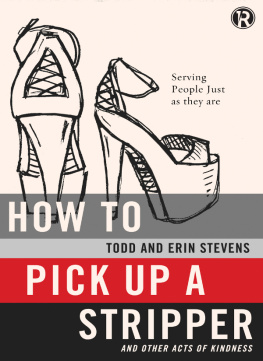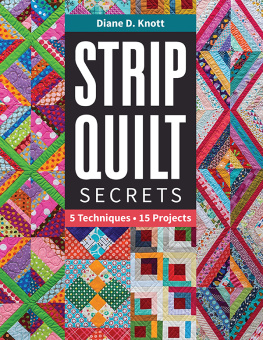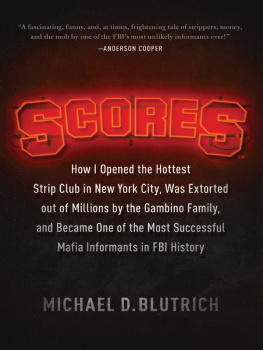About the Author
KIM PRICE-GLYNN is Assistant Professor of Sociology and Urban and Community Studies at the University of Connecticut.
Acknowledgments
Thanks hardly seems enough for the strippers, employees, owner-manager, and patrons from The Lions Den who welcomed me into their world and gave of their time so unselfishly. Since respect for their confidentiality prevents me from naming these individuals or the club where I met them, I can only provide my gratitude and say that without their assistance this work would have been impossible.
Many people have contributed helpful feedback at various stages of research and writing. At the University of MassachusettsAmherst, the insightful comments of Margaret Cerullo, Naomi Gerstel, and Jackie Urla early on were a tremendous help to me. In particular, Robert Zussmans mentoring and enthusiasm for this project have been invaluable. Gratitude also goes to my UMass writing group, Amy Armenia, Pat Duffy, Ingrid Semaan, and Kathy Walker, whose feedback always made the research and writing process more robust. Semaan, a colleague who fortunately bridges two of my universities, has been a constant source of camaraderie and intellectual exchange, for which I am grateful. At the University of Connecticut, I thank my colleagues in Sociology on the Storrs campus, in Womens Studies on the Stamford campus, and in Urban and Community Studies on the Greater Hartford campus. Mary Bernstein, Mary Cygan, Michael Ego, Davita Glasberg, Nancy Naples, Bandana Purkayastha, Katherine Ratcliff, Stephen Ross, Clint Sanders, Gaye Tuchman, and David Williams all deserve special thanks for their interest and support.
Thank you to New York University Press and, in particular, executive editor Ilene Kalish, whose enthusiastic guidance and considerable understanding of sociology and sex work research helped make my manuscript into a book. I appreciate the supportive feedback and attention to detail I received from NYU editorial assistant Aiden Amos, managing editor Despina Papa-zoglou Gimbel, copyeditor Cynthia Garver, and the meticulous reviewers brought on board by NYU.
Writing has always been a collaborative process for me. At different stages of this project I have been fortunate to have the watchful eyes of two talented writers. Leslie Harris, a dear friend and thoughtful critic, provided detailed comments and copyediting on an earlier draft of this manuscript. Her hard work, kind words, and good humor are much appreciated. Alice Julier, sociologist, author, and editor, also provided feedback and copyediting on a subsequent draft. This manuscript has benefited tremendously from her careful review.
Ohio Wesleyan was my launching pad, and I would be remiss if I did not recognize Ted Cohen, John Durst, Jason Good, Mary Howard, and Jan Smith, who encouraged me to pursue qualitative research as an undergraduate. Thanks to Durst for continued support reviewing this work and sharing it with his classes.
An earlier version of the discussion presented in first appeared in print in Gender & Society in 2008, and I am grateful for the permission to present an extended version of that discussion here.
Throughout this project, my husband, Eric Price-Glynn, has listened and advised me about my work, provided detailed comments on each chapter, and sacrificed sleep to await my arrival home from late nights in The Lions Den. His unwavering love and support remind me each day how lucky I am to have found him.
My parents, Christina and Ronald; my sisters, Cindy and Diana; my brothers-in-law, Brian and Doug; my nieces Christina and Maria; and my nephews Alexander, Nathaniel, Kyle, and Zachary are steady sources of happiness in my life. Their love, patience, and encouragement are always with memy love and thanks to you all, as well as to my new family, Patricia, Dan, Patrick, Michael, Lisa, Lynn, Ashley, Ava, and Leah Glynn.
Steve Shraison, my friend, ally, and mentor, did not get to see the completion of my dissertation or this book, but he certainly envisioned them. His passion and intellect remain an inspiration to me.
My son, Lucas, I am saving my final words of thanks for you. Occasionally sleeping on my lap and later tinkering with the keyboard, you too have contributed to this book. You have made my life so full of joy. I love you fearlessly.
Appendix 1
Researching The Lions Den
Is she attractive? This was the question posed by a students father upon learning that his sons professor carried out participant observation in a strip club. When the class laughed nervously at the students comment, I should have responded by asking if this students father was attractive, but I lacked the comedic timing and worried I might offend him. These kinds of inquiries have become routine, yet they often catch me off guard. There is something about the embodiment of sex work research that makes this study somewhat different from other forms of research I do. For example, I also study nursing assistants, but no one has ever asked me if I was a nursing assistant. No one cares about my physical appearance and how it may or may not relate to that work. Conversely, I am frequently asked if I have worked as a stripper. While this question has some merit, as it relates to insider/outsider debates in qualitative research, it is more often asked in similar fashion to the attractiveness questionfor titillation, and not for substance.
Yet, there is something to these questions. They are continual reminders of my experience. As a researcher, I was keenly aware of my physical presence in a potentially dangerous place. Each time I drove to the club, I would run through my list of ethnographers equipment. Research tools: small notepad, pens, cassette recorder, and tapescheck. Safety items: cell phone, drivers license, credit card, and $20 cash in pocketcheck. Everything I needed had to fit on my person since bags left unattended often came back short. Preparation was important so I could be smart about safety. This was, after all, The Lions Den.
Entry into The Lions Den
My introduction to this club came from Angela, a stripper and cocktail waitress, whom I met though a common friend while conducting exploratory interviews for this project. During our meeting, Angela mentioned there was and The Lions Den was no exception. Typically, jobs there were passed between friends and acquaintances; jobs were less often given to persons unknown to the club or its workers. Since I had no prior connection to The Lions Den or experience with strip club work, Angelas recommendation proved invaluable. My easy transition into club work and culture was due, at least in part, to my connection with her. She was well liked and trusted by all, including the clubs owner-manager. Early on, I became known as Angelas friend or someone Angela knew and was tentatively accepted by association until I developed my own presence in the club.
Participant Observation, Interviews, and The Lions Dens Employee/Entertainer Handbook
As an employee of the club, I worked as a cocktail waitress one seven-hour shift a week (typically on Thursdays, but also on other weekdays and weekends) for fourteen months. In addition to my scheduled shifts, I studied the club at other times for over five hundred hours of observation. Since I disclosed my plan to conduct research when I was hired, I could openly pursue my study. When conducting observations and working in the club, I took field notes both overtly and covertly using a pocket notebooksometimes behind the bar, in the dressing rooms, or in the bathroom; other times sitting openly in the main room. I also tape-recorded observations while driving home and typed additional notes after each visit. I recorded my observations to produce thick descriptions of the club, its occupants, and its culture.









